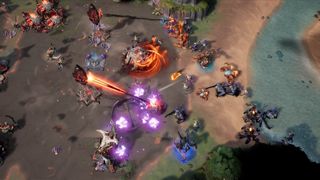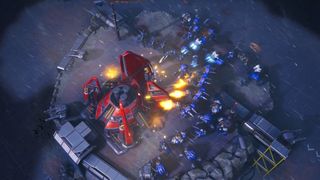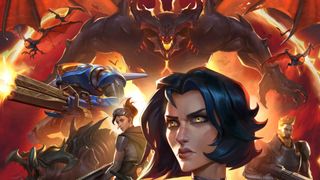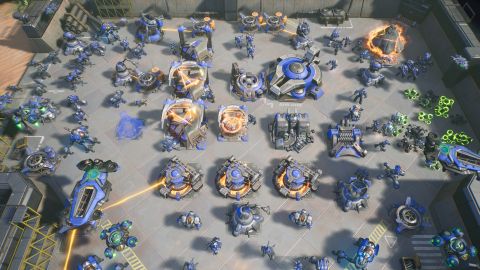Early Verdict
Stormgate has the makings of a great RTS, but it needs a stronger identity of its own in its full release.
Pros
- +
Nostalgic Blizzard vibes
- +
Evocative factions
- +
A solid RTS experience
Cons
- -
Maybe too referential
- -
Slow pace of play
- -
Likely to radically change
Why you can trust GamesRadar+
Stormgate has been anticipated for a while. Announced in 2022 and bolstered with a $2.3 million dollar Kickstarter in 2023, Stormgate has spent the last couple years pitching itself in a simple way: a new real-time strategy game made by some of the people who worked on Warcraft 3 and StarCraft II. As those franchises continue to languish, there's a big gap in the marketplace, and RTS circles have been buzzing about Stormgate regularly since the announcement.
Following its release into Early Access on July 30, I've had the opportunity to complete what exists of the single player campaign while also managing to put some time into the game's online multiplayer. The short is that the game feels a little messy and a little too complicated, and it is attempting to please a lot of different demographics of players without making the game truly appealing to any of them. It's the details of these appeals that matter, though.
I know that most people are thinking about Stormgate in terms of online multiplayer, but I think the storytelling and scene setting provided by the single-player campaign does critical work. The games that it is riffing on have had extremely long lives because they have provided a platform for head-to-head competition. StarCraft II's elegant triangular system of Terrans vs. Zerg vs. Protoss has resonated with players for more than 20 years, and there's an electricity in those legacy Blizzard properties that is obviously difficult to replicate. The place where that work can be done, and where we can learn about these factions and their modes of engagement, is in the campaign.
Familiar territory

Release date: August 13, 2024 (Early Access, with July 30, 2024 being the start for DLC purchasers)
Platform(s): PC
Developer: Frost Giant Studios
Publisher: Frost Giant Studios
Unfortunately, I think that the six missions of campaign that launched with the game's Early Access point to some of the key problems with Stormgate. Over the two and a half hours it took me to work through them, I was introduced to a member of the human Vanguard faction named Amara, whose father was involved in the event that summoned the Infernal Host into conflict with humanity. She's a militaristic badass haunted by the past and willing to do anything to defeat her enemy. That is essentially where her characterization begins and ends, and she's got a couple supporting characters for her to bounce off on in that journey.
The Infernal Host are essentially demons, and their continual invasion has decimated humanity over the past two decades. In the campaign missions that I was able to play, Amara learns about and decides to pursue a powerful mystical artifact that can destroy her enemies…but at what cost?
There is a tension in the campaign because it is fundamentally a story-driven set of missions meant to get us invested in this world. It is undeniable that it is well animated, that the voice acting is strong, and that the cinematics are directed and considered as much as any other top-tier gaming product today. At the same time, the story is so buried in the genre, and so clearly riffing on themes and ideas from StarCraft, Warcraft, and Diablo, that I began playing a subgame of "what game will the next plot beat come from"?
I have a huge amount of empathy for the team making this game because they are fundamentally selling a product that is marketed as a Blizzard product being made by a company that is not Blizzard but shares its DNA. They even named their company Frost Giant. So they are stuck trying to deliver something extremely familiar while also being fresh, but I am afraid that a world co-created by Chris Metzen after the heyday of Blizzard just might straight-up not have the juice. I imagine for some people these elements might create some warm and fuzzy feelings of stories played before. For me, they felt like a rerun.
Newly nostalgic

Detailing the strengths and weaknesses of the campaign and the setting of Stormgate is important because many of these same ideas bleed over into the online multiplayer. The game plays as a combination of StarCraft II's unit and base management systems and Warcraft 3's map management demands. In traditional RTS mode, you build little bases, make armies using the resources those bases create, and then try to take beneficial fights as you slowly overwhelm your opponent. The game maps themselves are covered in nodes that might be beneficial to control, like flags that heal you or resource gathering points, and so players have to compete for access and control of those as well.
The demands of these systems are tricky and I do not envy the work that Frost Giant's game designers have had to do for the past several years. They have had to create a game that is legible to newcomers and provides an on-ramp for learning the game, but they also have to create something with enough depth that long-time players of these other franchises might be lured into this new game.
Much like the campaign and its setting, where it feels like the past has overwhelmed whatever novelty this game might be bringing to these themes, the online multiplayer is a remix of previous Blizzard-adjacent games. The basic operations of the RTS – building bases, armies, upgrading them, getting into combat – are pretty uncomplicated and easy to operate. However, their complexity level is very high, and the campaign currently only exists for the Vanguard faction, meaning that you can only get a narrative "tutorial" for one faction.

A new RTS player might actually have an easier time than a veteran.
It is a fool's errand to try to run through what all three factions (Vanguard, Infernal Host, and Celestial Armada) do in detail. Very broadly, the Vanguard is a human faction that has effective direct damage units that can move around to control the map efficiently. The Infernal Host have either smaller swarm units or bigger, bulkier units, and all of them are powered up when they stay in their own territory – to win as the Host, you have to prioritize making that territory bigger. The Celestial Armada, my chosen faction, have a series of efficiencies and shortcuts that allow them to be mobile in taking new bases and quickly standing up defensive positions, but it comes at the cost of fast and efficient offense. Longtime players of StarCraft might recognize the broad strokes of the Terrans, Zerg, and Protoss here.
To Stormgate's benefit, these factions are not just the factions from this other game, but they do resemble them in many ways, and it takes a bit of gameplay to figure out the key differences in how you are supposed to use the factions and how you are supposed to defend against each of them. A new RTS player might actually have an easier time than a veteran, given that they would not be stuck with these resonances, but I am not sure – the evocation of the other games is so strong that it feels impossible to tell what being totally uncoupled would even look like.
As an Early Access product, Stormgate is a relatively fun experience. I cannot say that the campaign sample I had access to would make me interested in learning more about this world or these characters, given that their stories are so familiar to me already, but others with a higher tolerance or less baggage might feel differently. I'm also willing to see what happens, especially with the expectation that other factions will enter into the campaign in more substantive ways.
I do not think that the Early Access for Stormgate tells its future, especially given that RTS games undergo deep processes of rebalance on a regular basis. Right now, the game is fairly slowly paced and has a very high information bar to play. At the same time, it's fun and genuinely interesting to learn, and it would take me many dozens of games, and probably a few months, to determine something so simple as whether or not it is good or bad. I think that with my limited experience, I can say that it's a complex game, and it doesn't always feel or seem rewarding for all the complexity it demands. Luckily, I think the Early Access period will be a place for development and feedback, and I am looking forward to dipping into the online competitive mode every few weeks to see where the game goes from here.
Disclaimer
Stormgate was reviewed in Early Access on PC, with a code provided by the publisher.

Cameron Kunzelman is a critic with more than a decade spent writing about games for venues like Paste, Waypoint, Polygon, and Bullet Points. He podcasts about culture at Ranged Touch. His favorite movie is Road House.
